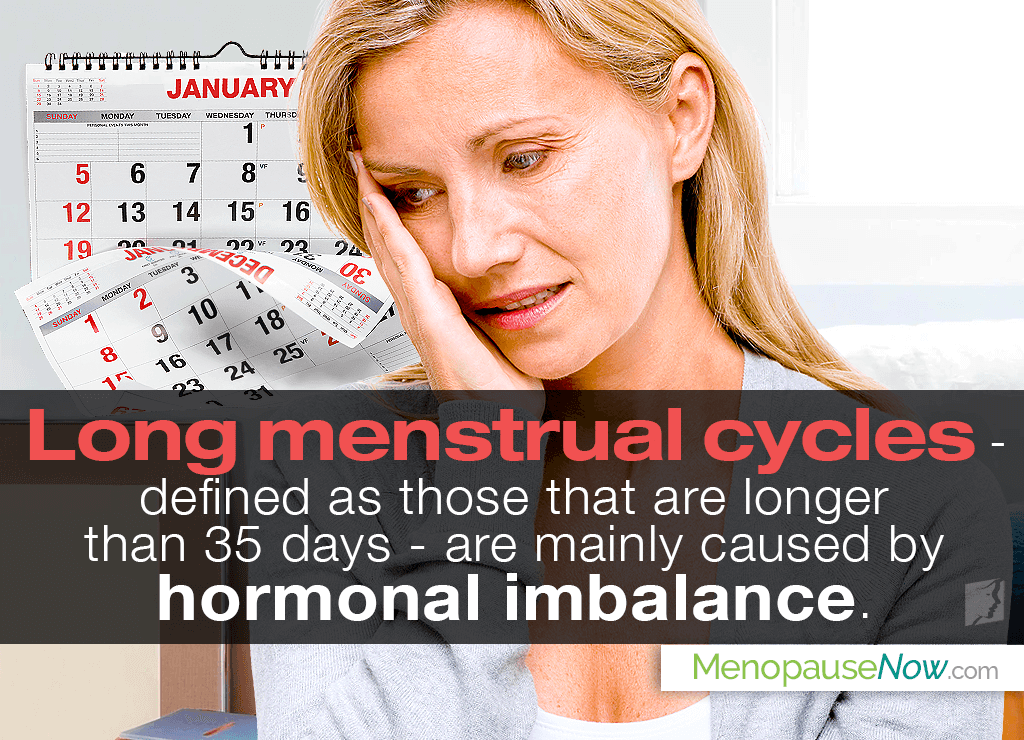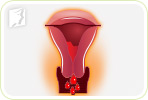Up to 15 percent of women in their childbearing years suffer from irregular periods, reconfirming the fact that menstrual cycle abnormalities are not only for those who are going through the menopausal transition.1 Although long menstrual cycles are often caused by the fluctuating hormone levels of perimenopause, there are many different reasons why a woman might experience them.
Continue reading to learn more about long menstrual cycles, including how long is a menstrual cycle, what causes long menstrual cycles, and effective treatment options for long-lasting relief.
How Long Is a Menstrual Cycle?
The average menstrual cycle lasts 28 days. However, cycles between 21 and 35 days, with three to five days of bleeding, is still considered healthy.
As such, irregular periods are broadly defined as those that have a heavier or lighter flow; are shorter than 21 days or longer than 35 days; are accompanied by pain, nausea, vomiting, or cramping; have bleeding or spotting between periods; or short or long menstrual cycle lengths.
There are numerous types of irregular periods, but when it comes to menstrual cycles that are longer than usual, oligomenorrhea is generally to blame.
Oligomenorrhea is defined as infrequent or very light menstruation, with long menstrual cycles of over 35 days in length.2 Once a woman has failed to menstruate for at least 90 days, oligomenorrhea turns into secondary amenorrhea, which is a condition defined as lack of periods.
What Causes Long Menstrual Cycles?
The most common cause of irregular periods is hormone imbalance, especially in perimenopausal women whose egg supply is running low.
However, irregular periods can also be caused by the following factors, to name a few:
- Stress
- Too much exercise
- Poor nutrition and eating disorders
- Diabetes
- Thyroid or pituitary dysfunction
- Pelvic inflammatory disease (PID)
- Polycystic ovarian syndrome (PCOS)
- Endometriosis
- Uterine abnormalities (polyps, fibroids)
- Primary ovarian insufficiency (POI)
- Medications (steroids, anticoagulants)
- Cervical or uterine cancer
Though the occurrence of more serious causes like cancer is rare, talking to your doctor about long menstrual cycles will eliminate any questions or concerns as he or she will know which diagnostic tests to run to confirm the underlying cause.
How to Treat Long Menstrual Cycles
If long menstrual cycles are being caused by hormonal fluctuations, read below for some suggestions to restore balance.
Alternative treatments
Many women have great success with phytoestrogenic supplements, such as black cohosh or red clover. These provide the body with plant-based estrogens, allowing for gradual and natural balance of estrogen that may be provoking irregular periods.
Meanwhile, women looking to nourish their endocrine glands without the introduction of exogenous or plant-based hormones into the body often turn to hormone-balancing supplements, such as Macafem.
Because they work with the body to encourage natural hormone production, they relieve not only long menstrual cycles, but a variety of other menopause symptoms as well.
Medications and surgery
Medications, such as birth control or hormone replacement therapy (HRT), can be helpful for regulating periods, though they often involve a higher risk and expense, including an increased risk of breast cancer.
Moreover, when abnormally long menstrual cycles are caused by fibroids, cysts, or endometriosis, surgery may be necessary.
Talk to your doctor to see if the cause behind your long menstrual cycles merit these options in the case that less risky methods do not suffice.
Conclusions
Period irregularities, like long menstrual cycles, can be frustrating and inconvenient, but with the right attitude and proper treatment, they could soon be a thing of the past. Click on the following link to discover more about the various treatments for irregular periods.
Sources
- Cleveland Clinic. (2019). Abnormal Menstruation (Periods). Retrieved October 23, 2019, from https://my.clevelandclinic.org/health/diseases/14633-abnormal-menstruation-periods
- Mayo Clinic. (2019). Menstrual cycle: What's normal, what's not. Retrieved October 23, 2019, from https://www.mayoclinic.org/healthy-lifestyle/womens-health/in-depth/menstrual-cycle/art-20047186
Footnotes:
- Penn Medicine. (2016). Women's Health Blog: When Should You See a Doctor for Irregular Periods? Retrieved October 23, 2019, from https://www.pennmedicine.org/updates/blogs/womens-health/2015/april/when-should-you-see-a-doctor-for-irregular-periods
- Habermann, T.M. & Ghosh, A.K. (Eds). (2008). Mayo Clinic Internal Medicine: Concise Textbook. Florida: Tylor & Francis Group. Available from Google Books.




